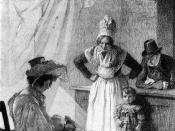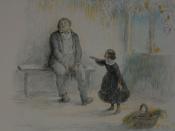Destiny: the seemingly inevitable succession of events.1
Is this definition true, or do we, as people in real life or characters in novels,
control our own destiny? Gustave Flaubert's Madame Bovary exemplifies how we hold destiny in our
own hands, molding it with the actions we take and the choices we make. Flaubert uses Emma Bovary,
the main character of his novel, to demonstrate this. Throughout her life, Emma makes many
decisions, each one of them affecting her fate and by analyzing these decisions one could see
from the beginning that Emma is destined to suffer. However, one can also pinpoint such decisions
making events as her marriage, her daughter's birth, her adulterous relationship with Leon and her
taking the poison, as times when, if she had made a different decision, her life would not have
ended as tragically.
When we first meet Emma, the future Madame Bovary, we perceive her as being a woman who is
refined perhaps a bit more than the average peasant girl living on a farm.
We conclude this
because she attended a boarding school where she was taught "dancing, geography, needlework and
piano." (p.15) Charles, on the other hand, gives her more credit than she deserves. He regards
her as well very educated, sophisticated, sensitive and loving, with the last characteristic
being the one she lacks most. Soon after Emma marries Charles we see her unhappiness, and we are
faced with a dilemma, why did she marry him? There are numerous possible answers to this, but
the end conclusion is the same: if she had not married him it would have been better for both of
them. Emma would not have been so miserable and depressed throughout her life and Charles would
have found someone who would return his love and who would...


